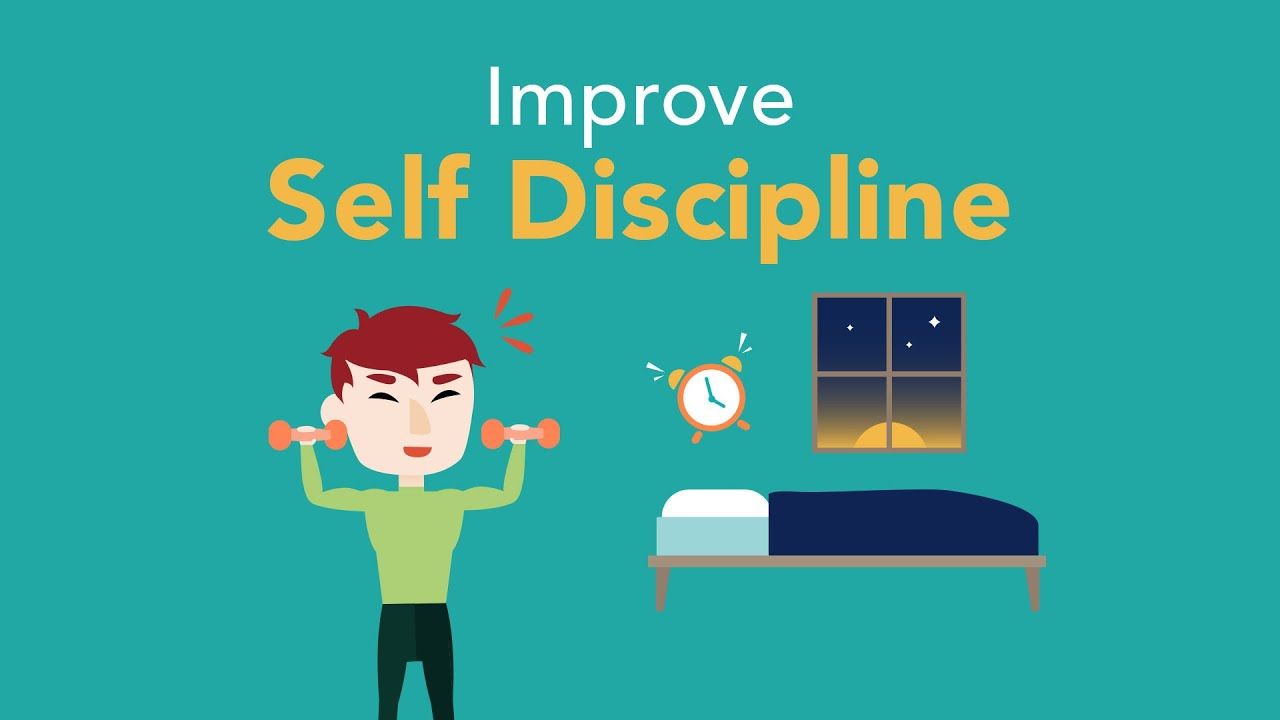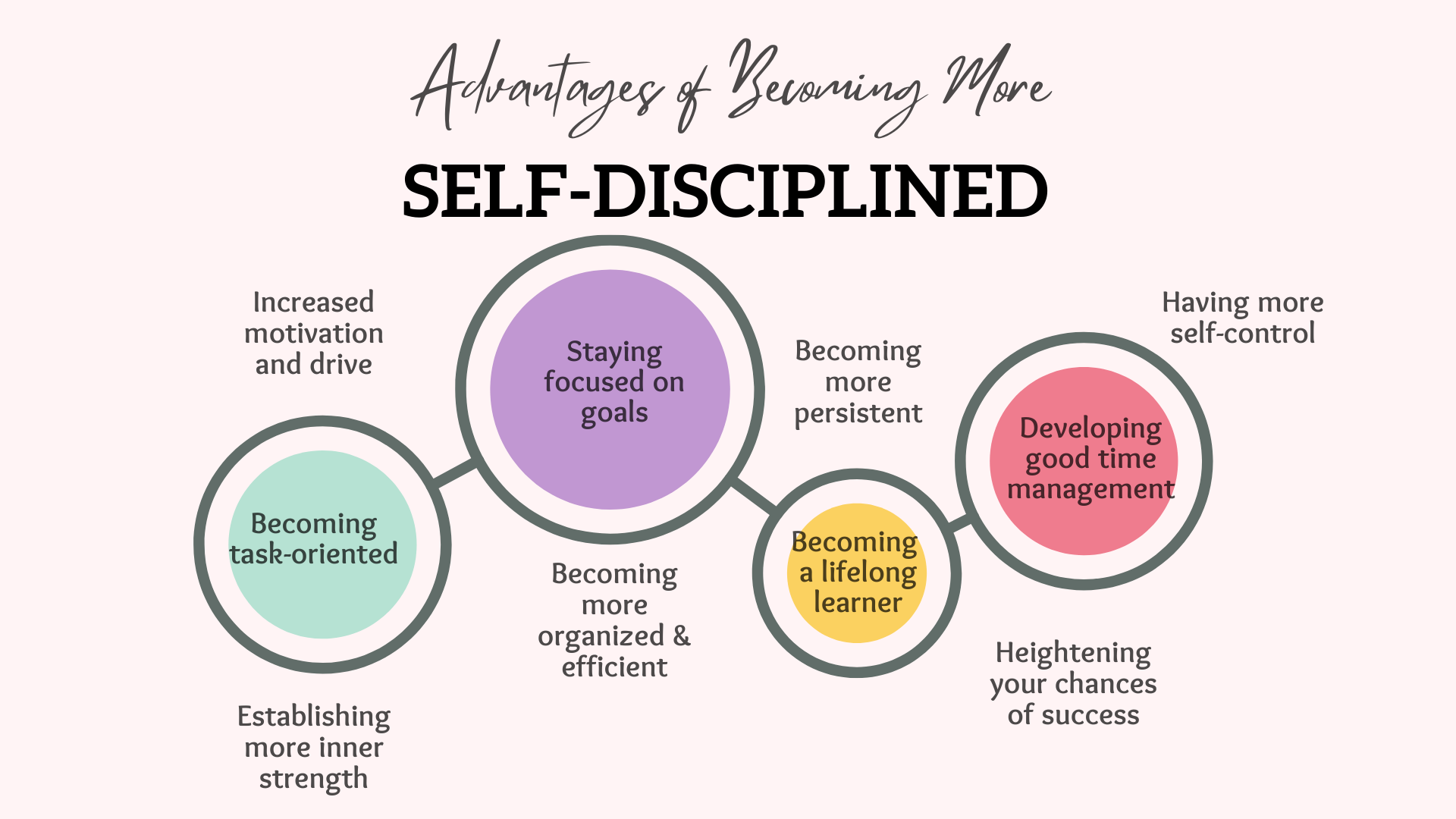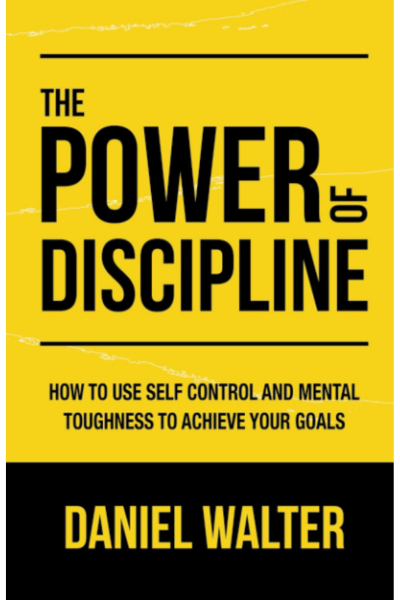Content Summary
Discipline is a fundamental aspect of human life that lays the foundation for success, personal growth, and ultimately, freedom. Often misconceived as a rigid and restrictive concept, discipline is, in fact, a powerful tool that empowers individuals to achieve their goals and live a fulfilling life.
It is the ability to control one's actions, thoughts, and behaviors in a consistent and focused manner, even when faced with challenges or distractions.
What is Discipline
Discipline can be thought of as the bridge between our goals and accomplishments. It requires a strong commitment to stick to a set of rules, principles, or routines that guide our actions toward achieving specific objectives.
Whether it's pursuing an academic degree, excelling in a sport, maintaining a healthy lifestyle, or mastering a skill, discipline acts as the driving force that keeps us on track despite the obstacles we encounter along the way.


The Importance of Discipline in Our Lives
Goal Achievement: Discipline is the driving force behind goal attainment. Without discipline, our dreams remain mere wishes floating in the clouds of imagination. By staying disciplined, we transform our aspirations into actionable plans and steadily progress toward turning them into reality.
Personal Growth: Embracing discipline leads to personal growth and development. The continuous effort to improve ourselves, stay focused, and adopt positive habits pushes us beyond our comfort zones, making us more resilient, adaptable, and competent individuals.
Time Management: Discipline helps us manage time effectively. It enables us to prioritize tasks, allocate time wisely, and avoid procrastination, ensuring that we make the most of each moment and achieve a balanced life.
Stress Reduction: A disciplined life leads to reduced stress levels. When we have control over our actions and are actively working towards our goals, we feel a sense of purpose and direction, which in turn alleviates anxiety and uncertainty.
Does Discipline Give Us Freedom
Contrary to the belief that discipline restricts freedom, it is, in fact, the very means to achieve it. Discipline empowers us to break free from the limitations that impede our progress. By adhering to self-imposed guidelines and focusing on our objectives, we free ourselves from distractions and unproductive habits that hinder personal growth.
The discipline to stay physically fit, for instance, may require adhering to a regular exercise routine and a balanced diet. While this might seem restrictive at first, it ultimately grants us the freedom to enjoy a healthier and more energetic life, allowing us to engage in activities we might have otherwise been unable to participate in.


Types of Discipline:
Discipline can be broadly categorized into two main types:
External Discipline: This type of discipline is enforced by external factors, such as rules, laws, or authority figures. It is commonly seen in educational institutions, workplaces, or society at large, where adherence to certain norms is essential for maintaining order and harmony.
Internal Discipline: Internal discipline, on the other hand, arises from an individual's own sense of responsibility and self-control. It is an innate determination to adhere to principles and values that align with personal goals and aspirations.
When Do We Know If We Have Discipline?
Assessing our own discipline can be challenging, as it requires honest introspection and self-awareness.
Here are some indicators that suggest we possess discipline in our lives:
Consistency: We consistently follow through with our plans and commitments, even when faced with obstacles or temptations.
Time Management: We can effectively manage our time, dedicating adequate focus and effort to each task without excessive procrastination.
Self-Control: We demonstrate self-control by resisting impulsive actions that may hinder our progress.
Willingness to Learn: We are open to learning and improving ourselves continuously, seeking knowledge and feedback from others.
Goal-Oriented: We set clear goals and work diligently towards achieving them, without getting easily discouraged.
How to Build Self-Discipline in 12 Steps Guide>>>
Most FAQs about Self-Discipline:
How to Develop Self-Discipline?
Developing self-discipline requires consistent effort and a willingness to cultivate positive habits and behaviors.
Here are some strategies to help you enhance your self-discipline:
Set Clear Goals: Define specific, achievable goals that align with your values and aspirations. Having clear objectives provides direction and motivation, making it easier to stay disciplined.
Create a Plan: Break down your goals into smaller, manageable tasks. Develop a step-by-step plan with deadlines to track your progress and hold yourself accountable.
Establish Priorities: Prioritize your tasks based on their importance and urgency. Focus on high-priority tasks first and avoid getting sidetracked by less critical activities.
Practice Time Management: Use time management techniques like the Pomodoro Technique or time-blocking to allocate your time effectively. This helps you maintain focus and avoid procrastination.
Remove Temptations: Identify and eliminate or minimize distractions and temptations that may hinder your progress. Create an environment that supports your self-discipline efforts.
Develop Daily Routines: Establishing consistent daily routines can help reinforce self-discipline. Stick to a regular schedule for tasks like waking up, exercising, working, and sleeping.
Build Willpower: Strengthen your willpower by gradually challenging yourself to resist small temptations. As you practice self-control in minor situations, it becomes easier to apply in more significant challenges.
Practice Self-Awareness: Be mindful of your thoughts and emotions. Recognize situations that may lead to impulsive decisions and work on responding rationally and in line with your goals.
Stay Positive and Persistent: Celebrate your successes, no matter how small, and maintain a positive attitude towards setbacks. View challenges as opportunities for growth and keep persevering.
Use Visualization and Affirmations: Visualize yourself achieving your goals and imagine the positive outcomes. Use affirmations to reinforce your commitment and belief in your abilities.
Seek Accountability: Share your goals with a trusted friend, family member, or mentor who can provide support and hold you accountable for your actions.
Practice Self-Compassion: Be kind to yourself, especially when you encounter setbacks or make mistakes. Instead of being overly critical, learn from the experience and use it as a stepping stone to improve.
Reward Yourself: Set up a reward system for achieving milestones or staying disciplined for a certain period. Treat yourself with something you enjoy, but ensure it doesn't contradict your goals.
Stay Committed: Developing self-discipline takes time and effort. Stay committed to the process and keep reminding yourself of the reasons why you want to be more disciplined.
Remember that building self-discipline is a gradual process, and it's okay to experience occasional slip-ups. The key is to learn from those moments, recommit to your goals, and continue making progress.
Over time, with consistent practice and determination, you will develop stronger self-discipline, leading to a more purposeful and successful life.
Does Self-Discipline is Considered as Will Power?
Self-discipline and willpower are related concepts, but they are not exactly the same thing. While they are interconnected and often work together, they represent distinct aspects of human behavior and decision-making.
Self-discipline refers to the ability to control one's actions, thoughts, and behaviors purposefully and consistently. It involves adhering to a set of principles, routines, or rules to achieve specific goals.
Self-discipline is a broader term that encompasses various aspects of life, such as time management, focus, consistency, and the ability to resist temptations and distractions.
Willpower, on the other hand, is a component of self-discipline. It specifically refers to the capacity to resist short-term gratification or impulses in favor of long-term goals. Willpower involves making conscious decisions that align with one's values and objectives, even when faced with distractions or instant rewards.
In other words, self-discipline is the overarching quality that encompasses the ability to control oneself, while willpower is one of the specific skills or characteristics that contribute to self-discipline.
Having strong willpower can certainly enhance one's self-discipline, but self-discipline also involves other elements, such as effective time management, consistent habits, and the ability to stay focused on long-term objectives.
Both self-discipline and willpower can be developed and strengthened through practice and conscious effort. By cultivating positive habits, setting clear goals, managing time effectively, and practicing self-control in various situations, individuals can enhance both their self-discipline and willpower, leading to greater success and personal growth.
Why Do People Have a Bad Self-Discipline?
People may have bad self-discipline for various reasons, and it's essential to understand that self-discipline is a skill that can be developed over time with conscious effort.
Some common factors that contribute to poor self-discipline include:
Lack of Clear Goals: Without clear and meaningful goals, individuals may struggle to find the motivation and direction to stay disciplined. Having specific objectives provides a sense of purpose and helps individuals focus their efforts.
Instant Gratification: The allure of immediate rewards or pleasures can override the desire to work towards long-term goals. People with poor self-discipline may prioritize short-term satisfaction over the more substantial benefits that come from delaying gratification.
Overwhelming Tasks: When tasks or goals seem too challenging or overwhelming, individuals may become discouraged and avoid taking action. Breaking tasks into smaller, manageable steps can make them less intimidating and improve self-discipline.
Lack of Willpower: As mentioned earlier, willpower is a crucial aspect of self-discipline. Some individuals may naturally have weaker willpower, making it harder for them to resist temptations or distractions.
Fear of Failure: Fear of failure can paralyze individuals and prevent them from taking action towards their goals. The fear of not succeeding or making mistakes can undermine self-discipline efforts.
Low Self-Esteem: People with low self-esteem may not believe in their abilities to achieve their goals, leading to a lack of motivation and self-discipline.
External Distractions: External factors, such as social media, constant notifications, or a chaotic environment, can divert attention and hinder self-discipline.
Lack of Accountability: Without external accountability or support, individuals may find it easier to give in to distractions and lose focus on their goals.
Negative Self-Talk: A negative internal dialogue can erode self-discipline. Self-critical thoughts like "I can't do it" or "I'm not good enough" can undermine confidence and motivation.
Unhealthy Habits: Engaging in unhealthy habits, such as excessive procrastination, lack of exercise, or poor time management, can weaken self-discipline in various aspects of life.
Stress and Burnout: High levels of stress and burnout can deplete mental energy and willpower, making it challenging to stay disciplined.
It's important to recognize that self-discipline is a skill that can be developed and strengthened through consistent practice and self-awareness. By addressing the underlying factors that contribute to poor self-discipline and implementing strategies to overcome challenges, individuals can gradually improve their self-discipline and achieve their goals more effectively.
What are the Examples of Good Self-Discipline?
Good self-discipline manifests in various aspects of an individual's life, and examples of good self-discipline can be seen in:
Consistent Exercise Routine: Maintaining a regular exercise schedule, whether it's going to the gym, practicing yoga, or engaging in daily walks, demonstrates self-discipline in taking care of one's physical health.
Healthy Eating Habits: Making conscious and balanced food choices, avoiding unhealthy snacks, and practicing portion control are examples of self-discipline in maintaining a healthy diet.
Sticking to Study or Work Schedule: Setting aside dedicated time for studying or work, and adhering to a well-structured routine, showcases self-discipline in pursuing academic or professional goals.
Resisting Temptations: Turning down distractions like excessive socializing, procrastination, or unnecessary expenses in favor of focusing on essential tasks reflects self-discipline.
Managing Finances Wisely: Saving money, avoiding impulsive purchases, and budgeting responsibly are signs of self-discipline in managing personal finances.
Consistent Sleep Patterns: Prioritizing adequate and consistent sleep hours to ensure optimal rest and productivity demonstrates self-discipline in maintaining a healthy sleep routine.
Goal Setting and Achievement: Setting specific, measurable, achievable, relevant, and time-bound (SMART) goals and working steadily towards achieving them reflects strong self-discipline.
Emotional Regulation: Maintaining composure and managing emotions effectively in stressful situations is a display of self-discipline.
Daily Routine Maintenance: Sticking to a well-organized daily schedule that includes time for personal growth, work, leisure, and self-care shows self-discipline in managing time effectively.
Continuous Learning: Taking the initiative to learn new skills, pursue educational opportunities, or engage in self-improvement activities demonstrates self-discipline in personal growth.
Consistent Practice of Hobbies or Skills: Regularly practicing and honing a skill or hobby, whether it's playing an instrument, painting, writing, or any other creative pursuit, showcases self-discipline.
Respecting Commitments: Honoring promises and commitments to others, such as meeting deadlines, attending appointments, or helping friends in need, reflects self-discipline in honoring one's word.
Maintaining a Positive Mindset: Cultivating a positive attitude and focusing on solutions rather than dwelling on problems displays self-discipline in maintaining mental resilience.
Personal Development: Taking responsibility for self-improvement by seeking feedback, attending workshops, or working with mentors exemplifies self-discipline in pursuing personal growth.
Overall, good self-discipline involves making consistent efforts to stay focused, stay committed to personal values and goals, and demonstrate responsibility in various aspects of life. It is a powerful quality that enables individuals to achieve their full potential and lead a purposeful and fulfilling life.
Does Self-Discipline Lead to Freedom?
Yes, self-discipline can lead to freedom. While it might seem counterintuitive at first, self-discipline provides the foundation for true freedom and liberation in various aspects of life.
Here's how self-discipline leads to freedom:
Freedom from Procrastination: By practicing self-discipline, individuals can overcome the habit of procrastination, which often leads to stress, missed opportunities, and a sense of being trapped in unproductive cycles. When we take control of our actions and manage our time effectively, we free ourselves from the burden of constant delays and missed deadlines.
Freedom from Bad Habits: Self-discipline empowers individuals to break free from destructive or unhealthy habits such as excessive drinking, smoking, or overeating. By exercising self-control and making positive choices, individuals can liberate themselves from the negative consequences of these habits and lead healthier lives.
Freedom from Impulse: Impulsive actions can lead to regrets and adverse outcomes. Self-discipline allows individuals to resist impulsive decisions and instead make well-thought-out choices based on their long-term goals and values.
Freedom from Financial Stress: By exercising self-discipline in managing finances, individuals can avoid overspending, debt, and financial stress. This financial responsibility leads to the freedom of financial security and peace of mind.
Freedom from External Control: When we are self-disciplined, we are less susceptible to external influences and peer pressure. We can make independent decisions based on our own values and principles, granting us the freedom to be true to ourselves.
Freedom to Pursue Goals: Self-discipline helps individuals stay focused on their goals and consistently work towards achieving them. This focus and dedication lead to the freedom to realize one's dreams and aspirations.
Freedom from Mental Turmoil: A disciplined mind can better handle stress and emotions, leading to a calmer and more peaceful state of mind. By managing emotions and staying composed, individuals gain the freedom of inner tranquility.
Freedom of Time Management: Effective time management through self-discipline enables individuals to allocate time according to their priorities. This freedom to manage time efficiently allows for a better work-life balance and reduces the feeling of being overwhelmed.
Freedom to Create Positive Habits: Self-discipline allows individuals to develop and maintain positive habits that contribute to personal growth and well-being. These positive habits lead to the freedom of a healthier and more fulfilling lifestyle.
Freedom to Live Authentically: Ultimately, self-discipline gives individuals the freedom to live authentically and with integrity. By being true to oneself and following a path aligned with personal values and goals, individuals experience a sense of freedom and fulfillment.
While self-discipline may require effort and conscious practice, the rewards of freedom it brings are significant and far-reaching. By taking charge of our actions and making choices that align with our long-term aspirations, self-discipline empowers us to lead more meaningful, purposeful, and liberated lives.
Author's Choice of Self-Discipline Tools:



Conclusion
In conclusion, discipline is the guiding force that propels us toward our aspirations, leading to personal growth, success, and a sense of freedom. Embracing discipline in our lives allows us to overcome challenges, remain focused on our objectives, and live a purposeful and fulfilling life.
By acknowledging and nurturing discipline within ourselves, we unlock the potential to become the best version of ourselves and create a life of purpose and meaning.
Relevant Reads>>>













